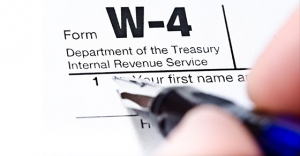
Do your employees a favor and remind them about their W-4s
Employees don’t always fill out their W-4 forms accurately. For example, some may wrongly write “exempt” on the withholding portion of the form to ensure that no federal or state tax is withheld. Others may be inadvertently underwithholding because of recent tax law changes.
Although the employees themselves are liable for improperly completing their W-4s, you can do them a favor by reminding them of possible mistakes. After all, the IRS may eventually come calling on your organization if someone appears to be underwithholding.
Key questions
Here are some questions to ask when determining whether an employee can legitimately claim to be exempt from withholding:
Did the employee have a tax liability in the previous year? If the employee received a refund of all federal income tax paid (or had a right to a refund), he or she may be able to claim exempt status, depending on the answer to the next question.
Does the employee expect to have a tax liability this year? To legitimately claim to be exempt, the employee must be able to state that he or she had no tax liability last year and doesn’t expect to have a tax liability this year.
Also, an “exempt” W-4 is valid for only one year and expires in February of the following year. If your payroll includes employees who claim to be exempt, require them to fill out new W-4 forms annually.
TCJA impact
Because of the many changes wrought by the Tax Cuts and Jobs Act (TCJA), and as you’re likely aware, earlier this year the IRS issued new withholding tables — and withholding amounts have generally dropped. The new tables are intended to work with current W-4 forms. However, just because you’re correctly following the withholding tables for an employee doesn’t mean the employee isn’t having too little (or too much) tax withheld.
Remind all employees that they should use the new IRS calculator (available at irs.gov) to determine whether the appropriate amount is being withheld. If it isn’t, they should submit a new W-4 to you to adjust their withholding. Employees who may be at risk for underwithholding include those who itemize deductions, who hold multiple jobs, or who have dependents age 17 or older.
More changes ahead
IRS Form W-4 is currently in a bit of a state of flux. A new version of the form is expected for 2019 that more clearly reflects the TCJA’s provisions. Some of the applicable rules for filing the form could change along with it. Our firm can keep you apprised of the latest news affecting W-4s and help you gather and verify the right information.








Leave a Reply
Want to join the discussion?Feel free to contribute!